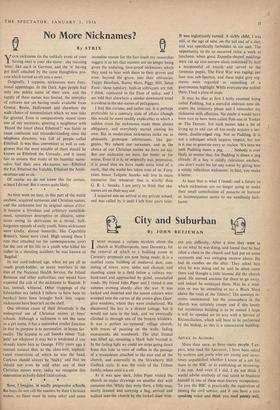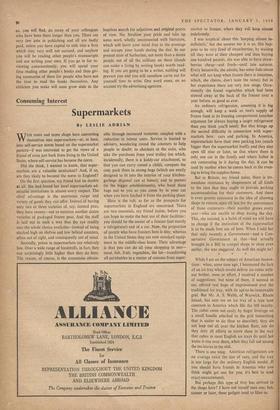City and Suburban
By JOHN
BETJEMAN
Ntusi recount a curious incident about the I church at Wolfhampcote, near Daventry, for the removal of which to a building estate in Coventry proposals are now being made. It is a mottled stone building of mediaeval date, con- sisting of tower, nave, aisles and chancel, and standing alone in a field below a railway em- bankment and approached by gated, unmetalled roads. My friend John Piper and I visited it one autumn evening shortly after the war. It was locked and deserted and the sunset colours were scooped into the curves of the crown-glass Geor- gian windows, where they were unshattered. We discovered the key in a distant cottage, but it would not turn in the lock, and we eventually climbed in through one of the broken windows. It was a perfect un-'restored' village church, with traces of painting on the walls, fading monuments, old woodwork. The altar frontal was lifted up, revealing a black hole beyond it In the failing light we could see steps going down from this hole to rows of coffins in the passage of a mausoleum attached to the east end of the church, and externally in the Strawberry Hill Gothick style. It was the vault of the Tibbets family, whose crest is a cat.
As it was now dark, John Piper visited the church to make drawings on another day with someone else. While they were there, a little man, neatly dressed and carrying a bag, arrived and walked into,the church by the locked door with- out any difficulty. After a time they went in to see what he was doing, and found that he had rifled a chest in the church and had put on some vestments and was swinging incense about. He had lit candles on the altar. They asked him what he was doing and he said he often came there and thought a little incense did the church good. He seemed anxious -for them to go away, and indeed he outstayed them. Was he a mad- man or was he intending to say a Black Mass above the vault of the Tibbets? The question re- mains unanswered, but the atmosphere in the church was certainly creepy and if this lovely but mysterious building is to be moved I hope it will be speeded on its way with a Service of Reconciliation, which will have to be performed by the bishop, as this is a consecrated building.
ADVICE TO AUTHORS
More than once, as have many people, I ex- pect, who read the Spectator, I have been asked by authors and poets who are young and some- times unpublished whether I know of a job for them in the BBC or in publishing or reviewing. I do not. And even if I did, I do not think I would advise anybody of real talent to frustrate himself in one of these near-literary occupations. To join the BBC is practically the equivalent of joining the civil service, and if you have a nice speaking voice and think you read poetry well, so, you will find, do many of your colleagues who have been there longer than you. There are very few jobs in publishing and all are badly paid, unless you have capital to sink into a firm which may very well not succeed, and anyhow you will be reading other people's manuscripts and not writing your own. If you go in for re- viewing conscientiously, you will spend your time reading other people's books and then giv- ing summaries of them for people who have not the time to read the books themselves. Any criticism you make will soon grow stale in the hopeless search for adjectives and original points of view. No. Swallow your pride and take up some work wholly unconnected with literature, which will leave your mind free in the evenings and occupy your hands during the day. In our present state of barbarism, not more than a dozen people out of all the millions on these islands can make a living by writing books worth read- ing. If you are going to be a writer, nothing will prevent you and you will somehow carve out for yourself time to write. One word more, on no account try the advertising agencies.











































 Previous page
Previous page